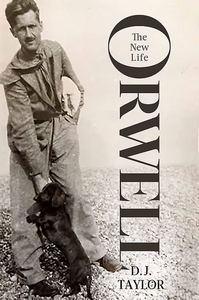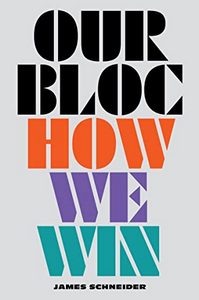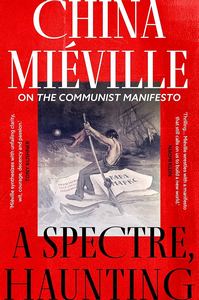Book Reviews – Orwell, Schneider, Mieville
 Orwell: The New Life. By D.J. Taylor, Constable, 2023
Orwell: The New Life. By D.J. Taylor, Constable, 2023
Eric Arthur Blair was born in 1903. In 1933 he adopted a pen name for his first book mainly because he thought the seedy subject matter of Down and Out in Paris and London would upset his parents. It was George, after the reigning monarch, and Orwell, after his favourite river in Suffolk. Having shown little previous interest in politics, at the end of 1936 he decided he wanted to ‘fight fascists’ in the Spanish Civil War. He travelled independently to Barcelona and served with POUM (Workers Party of Marxist Unification). His service on the front line ended when he was shot by a sniper. His Homage to Catalonia noted two years later that the real aim of the military mutiny, backed by the Church and landowners, was not to impose Fascism but to restore feudalism.
In Spain he befriended members of the ILP (Independent Labour Party) and on his return to England he joined the ILP because, Orwell said, they were the only party ‘which aims at anything I should regard as Socialism’. A little later he wrote that he hoped to see ‘something that has never existed before, a specifically English socialist movement’ (Orwell’s emphasis; The Lion and the Unicorn, 1941). His conception of socialism was mainly state interventionist: nationalisation, income limitation and reform of education. On this last reform, Orwell had wanted his son to go to Eton, as he had, though eventually he put his name down for Westminster Public (that is, private) School.
Taylor claims that one consequence of his experience fighting in Spain was a newfound pacifism; Orwell wrote about the looming Second World War ‘in which I do not intend to fight’. His wife Eileen commented on the psychological effect of his six months in Spain and that her husband had turned to ‘complete pacifism’. But Orwell was a committed patriot and as the Second World War was near he wrote in his diary that ‘I would give my life for England’. On the possibility of a Nazi invasion in 1940: ‘there is nothing for it but to die fighting, but one must above all die fighting and have the satisfaction of killing somebody else first’. The ILP were now deemed to be hopelessly pacifist: they ‘live almost entirely in a masturbation fantasy, conditioned by the fact that nothing they say or do will ever influence events’.
Orwell sometimes contributed articles to a small but influential quarterly magazine called Adelphi. Founded by John Middleton Murry in 1923, it was self-consciously ‘literary’ in tone. Taylor states that It had ‘unorthodox Marxism’. He doesn’t explain what that means but it’s probably their writers not being members or supporters of the Communist Party. Adelphi had an important influence on Orwell and the contacts it provided in the north of England enabled him to do the research which was published as The Road to Wigan Pier in 1937. In 1932 Murry had read the Socialist Party pamphlet Why Capitalism Will Not Collapse and wrote to us saying: ‘It seems to me I ought to join’. He didn’t pursue the matter and in any case we pointed out that we didn’t allow members of other political organisations to join us – he was a member of the ILP. Later in his life Murry became a Tory and an advocate of war against Russia.
During the Second World War, while serving in the Home Guard in London, a member of his platoon put a direct question to Orwell: ‘Are you a communist?’ To which Orwell replied: ‘It depends what you mean.’ It’s not known whether he elaborated, but Taylor is baffled by Orwell’s response and accuses him of being ‘enigmatic’ and speaking ‘delphically’. However, for many Socialists this exchange will be familiar; we sometimes get asked the same question and we usually give the same answer as Orwell as a start. Like Orwell, we have been bitterly opposed to the Communist Party and its regimes; but we accept a properly understood conception of communism — classless, moneyless, stateless. Orwell never identified as a communist but he obviously knew enough about communism to differentiate it from what he called ‘the smelly little orthodoxies’ of the Communist Party and similar organisations. His response suggests that he saw nothing objectionable in communism, even if he didn’t support it himself.
Orwell mentions the Socialist Party a few times in his work as a journalist. In his Observer article covering a few London constituencies in the 1945 general election he claims that the Tory candidate in Paddington North could win, and that if he does:
‘It will quite likely be because Mr C Groves, the Socialist Party of Great Britain candidate (this is the sole constituency the SPGB is contesting) has split the Labour vote’ (24.06.1945).
The Labour candidate, General Mason-Macfarlane, won comfortably. Orwell had made enquiries at the Socialist Party election office in Paddington North and it’s possible that he took this opportunity to buy Socialist Party literature. His collection of political pamphlets (tinyurl.com/297szbet) is held by the British Museum and it includes these by the Socialist Party:
- The Socialist Party – Its Principles and Policy (1934)
- War and the Working Class (1936)
- The Socialist Party Exposes Mr Chamberlain and His Labour Critics (1938
- The Next Step for Trade Unionists (1939)
- Socialism (1941)
- Family Allowances: A Socialist Analysis (1943)
- Should Socialists Support Federal Union? (Two editions: 1940
and 1943)
They can be downloaded from our website at https://www.worldsocialism.org/spgb/pamphlets-date-order/.
Orwell wrote six novels and he would probably have been considered a minor novelist of the twentieth century were it not for the last two: Animal Farm (1945) and Nineteen Eighty Four (1949), which made him world famous. Taylor argues that all his novels feature a rebellion that fails; there could be an interesting link between this and Orwell’s political outlook but he doesn’t pursue it. The last books gave many the impression of being anti-Russian or ‘anti-Soviet’, but Orwell regarded himself as anti-totalitarian; in a letter to a friend he wrote:
‘I don’t think I could fairly be described as Russophobic. I am against all dictatorships and I think the Russian myth has done frightful harm to the leftwing movement in Britain and elsewhere, and that it is above all necessary to make people see the Russian regime as it is.’
Orwell died from tuberculosis in 1950. The title of this book may suggest his reincarnation, but it’s merely a new edition of his life story first published in 2003. Taylor doesn’t mention the Socialist Party.
LEW
 Our Bloc: How We Win. By James Schneider. Verso. 2022. 133pp.
Our Bloc: How We Win. By James Schneider. Verso. 2022. 133pp.
Antonio Gramsci, the Italian political activist and theorist, who spent long years in prison during the 20th century inter-war years for his opposition to Mussolini’s Fascist regime, developed the theory of the historic bloc. According to this theory, in order to spark revolutionary change, a variety of progressive forces must come together in their ideas and across social and political practice to challenge the dominance of the ruling class over society and its institutions. In Our Bloc: How We Win, James Schneider, co-founder of the pro-Corbyn ‘Momentum’ organisation, takes up Gramsci’s idea and seeks to apply it to the contemporary political situation in Britain.
He foresees a situation in which the left of the Labour Party comes together with an alliance of organisations such as trade unions and protest groups (eg, Stop the War, BLM, XR, Make Amazon Pay), referred to as ‘progressive social forces’, to take over the running of the country either via a revitalised Labour Party or a new political grouping outside Labour that espouses what he frequently refers to as ‘socialism’. He is entirely opposed to the current direction of the Labour Party under Keir Starmer, neatly summed up in one of his chapter titles as ‘Capital’s A and B Team’. He deplores Starmer’s attempt to drive from positions of influence all figures that would stand up for the ‘wide-reaching reforms’, which he sees as fundamental to the ‘progressive’ elements within the Party. The bloc that stands for those reforms needs to campaign for them, he argues, and, once it has wide support and is elected to office, to put them into action. So, though referring to such a process as ‘transformational’ and capable of ‘overturning the established order’, it is clear that the writer’s agenda is essentially a reformist one.
Not that this stops him from constantly referring to this agenda as ‘socialism’ and its supporters as ‘socialists’. Needless to say, this does not correspond to the Socialist Party’s vision of socialism – a classless, wageless, moneyless society based on common ownership, democratic control and production for use not profit. We do not of course have any kind of monopoly on the word ‘socialism’, but to use it, as James Schneider does, to mean reforms of the existing system which he deems ‘progressive’, can only sow confusion and serve to obscure the idea’s more far-reaching meaning, of which Schneider shows no sign of having any awareness. Instead, his view of socialism is a collection of various reforms aiming to ‘noticeably improve the lives of the overwhelming majority’. He talks of the need for his ‘left bloc’, once in power, to enact policies like an increase in the minimum wage, a ‘universal basic dividend’, more money spent on health, education and social security, nationalisation of utilities and making the ‘wealthy and big business’ pay for that by ‘increasing taxes on the rich’. He has in fact a whole, somewhat breathless, slew of ideas for reformist change, and, in his final chapter (entitled ‘Ways of Winning’), he proposes four possible scenarios over the 2020s by which his new grouping might, via ‘a progressive surge’, gain influence and support sufficient to win an election, establish a ‘socialist government’ and put its reforms into effect.
In a sense all this is commendable, but it fails to take into account that governments do not control the system they administer, especially the economic side of it. So the potential for reforms depends not just on the will of government – any government – but on wider conditions in the system of the buying and selling of goods and services on the market. And, above all, even if it was possible to implement the reforms envisaged by Schneider via his ‘left bloc’, they would not (nor could they) change the basic premise on which the current (capitalist) system is based, that is the buying and selling of goods and services, production for profit and, above all, the workings of the world market. They would in fact constitute no more than a tinkering at the edges of the problems the vast majority of wage and salary workers face the world over. They could certainly not form the basis for a genuine socialist movement needing to take the step that would be truly ‘transformational’ of abolishing the wages and money system and bringing in a democratic, cooperative world system of free access to all goods and services using the know-how, the technology and the resources that now exist to satisfy all human needs – and of course without trashing the planet.
So this is a book that, while closing with the far-reaching, indeed revolutionary, sentiment of ‘we have a planet to save and a world to win’, in its substance accepts capitalism (even if the word itself does not get a single mention) and chooses rather to propose alternative ways of running its money, wages and buying and selling system.
HKM
 A Spectre, Haunting: On The Communist Manifesto. By China Miéville. Head of Zeus £10.99.
A Spectre, Haunting: On The Communist Manifesto. By China Miéville. Head of Zeus £10.99.
China Miéville is best-known as a science fiction author. He is also a former member of the SWP, and his history of the Bolshevik ‘Revolution’, October, was reviewed in the November 2017 Socialist Standard. Here he examines the writing, reception and arguments of the Communist Manifesto.
The Manifesto was written in 1848. It bears the names of both Marx and Engels, though it is usually ascribed to Marx alone, who certainly authored the text. But Miéville takes the reasonable view that Engels was equally responsible, as he not only influenced Marx but had previously written documents that were ‘a crucial concrete foundation’ for the work. Its German title is more exactly rendered as Manifesto of the Communist Party, but a party at that time was a tendency or current of opinion, not an organised group. The fact that Marx was working against a deadline probably explains why the final section is brief and unfinished.
The first English translation, by Helen Macfarlane, appeared in 1850, but there was rather little interest in the text, in any language, until the 1870s, in the aftermath of the Paris Commune. The standard English translation, by Samuel Moore with support from Engels, was published in 1888.
One point which often surprises those who read the Manifesto for the first time is the extent of praise for capitalism in the first section, such as ‘The bourgeoisie, during its rule of scarce one hundred years, has created more massive and more colossal productive forces than have all preceding generations together’, though Miéville sees this admiration as ambivalent, given the suffering that was also caused. The text is understandably unaware of the adaptability of capitalism. The actions mentioned in the second section (including making the means of production state property) were described as already out-of-date by the time the preface to the German edition of 1872 was composed. One reasonable point Miéville makes is that the Manifesto does not pay sufficient attention to the status of women, noting that they are oppressed in the family but not saying much about the relation between gender and class.
One chapter deals with criticisms of the Manifesto, including of course absurd claims that it is responsible for dictatorial regimes such as the former Soviet Union. Miéville argues that the problems there really began with its isolation in the 1920s, which opened the way to the appalling repression under Stalin. But this conveniently ignores the authoritarian policies under Lenin and Trotsky.
This edition also contains the text of the Moore translation, with a few adjustments. The most important of these is the rendering ‘the isolation of rural life’ rather than ‘the idiocy’.
PB
